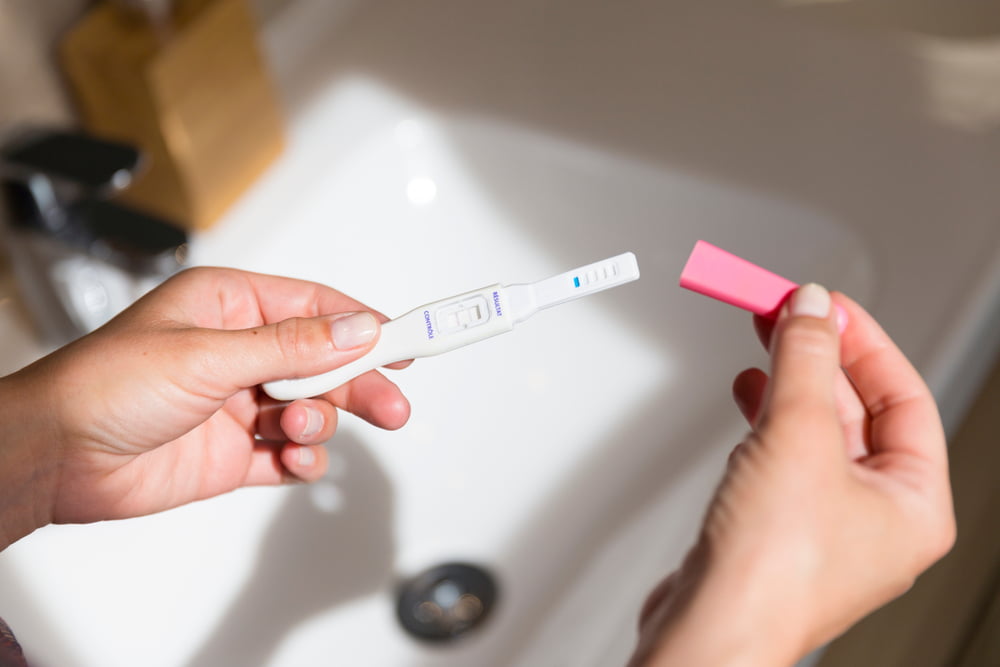
A pregnancy test is an easy and effective tool for a woman who thinks she may be pregnant. For the most part, they are very accurate, too. Most tests have a 99 percent accuracy rate, but some factors can affect the results. How and when you take the test does matter, including what time of day you take it.
Is My Pregnancy Test Accurate?
Pregnancy tests look for a specific hormone in urine. The placenta produces the hormone human chorionic gonadotropin (hCG) during pregnancy. hCG is sometimes called the pregnancy hormone for this reason.
Human chorionic gonadotropin stops menstruation and helps thicken the lining of the uterus. It also plays a crucial role in the development of an embryo. Hormones serve as messengers. hCG helps control the messages that affect pregnancy, especially during the first trimester. Around the thirteenth week, hCG levels begin to drop.
The body produces minimal hCG within a few weeks after conception. Levels of the hormone rise during those first few weeks and peak at about sixteen weeks of pregnancy. This rise is why some pregnancy tests say they are accurate within a day or two after you miss your first period. They can detect lower levels of hCG. Other tests may not be as accurate until after the sixth week because they are not as sensitive.
Accuracy depends on the levels of hCG in the urine. If you take the test too early in your pregnancy and get a negative result, it may not be accurate.
Can I Take a Pregnancy Test at Night?
The short answer to “Can I take a pregnancy test at night?” is yes. Technically, you can take a pregnancy test any time of day. The overwhelming factor in the accuracy level of a pregnancy test isn’t what time of day it is but where you are in your pregnancy. If you take the test too early in the pregnancy, you could get a false negative because your body isn’t producing a detectable amount of hCG yet.
However, time of day can be a factor for another reason – urine concentration. As you read through the instructions on the package, you might see a recommendation that you take the test in the morning. This is when urine has the highest hormone concentration because you don’t go to the bathroom as much when you sleep. You also are not drinking a lot of fluids during this time.
The test manufacturer wants you to take the test when it is most likely to detect hCG. Morning urine lowers the risk of a false negative because the hormone levels will be at their highest. However, that doesn’t mean you can’t take the test at night and get accurate results.
What If I Get a Positive Result From a Test at Night?
In the world of pregnancy tests, negative may be false, but positive is usually positive. In other words, any time you get a positive result, you are likely pregnant. A few exceptions, such as taking fertility drugs, can lead to a false positive, but as a general rule, positives are accurate.
When Should I Take a Pregnancy Test?
It is essential that you keep timing in mind when taking a pregnancy test. First, read the directions for any pregnancy test you purchase and follow them. The manufacturer can provide the best information for accurate results.
On average, there are four things to keep in mind when taking a pregnancy test:
- Where you are in your cycle – For most tests on the market, you must wait until a week after you miss your period. Some more sensitive brands say to wait at least a day after a missed period. It can be difficult to judge if you have an irregular cycle. If so, wait at least two weeks after you think you might have gotten pregnant. If you believe conception occurred on Friday, wait two weeks after that day, then take the test.
- Morning is the best time to test – You can take the test any time, but you have a better chance at accuracy if you test your first urine of the day. If you try to test at night the day after your missed period, you might get a false negative. If it has been weeks since you missed your period, it probably won’t matter as much.
- Get confirmation – Positive or negative, you will want to confirm your results. If you have a negative test and are still unsure, wait a week and retest. Positive probably means you are pregnant, but you still need to get checked out.
- Do you feel pregnant? Many women think they know they are pregnant even without a test. Their body tells them. If you feel nauseous or are vomiting, especially in the morning, if your breasts are sore, or if you are extra tired or hungry, you may be pregnant even if the test is negative. If you think it is possible for whatever reason, make an appointment to see a healthcare professional.
How Can I Confirm a Pregnancy Test?
The surefire way is going to be to see a healthcare professional. They can do a more sensitive lab test. A lab-quality test can confirm pregnancy, and so can an ultrasound. If you think you might be pregnant, make an appointment no matter what the test says.
If you live in Missouri, make an appointment today at Willowbrook Women’s Center. We offer pregnancy services that can confirm the test for you. We are also there to discuss your next steps.
